
|
||||||||||||||||||||||
 |
||||||||||||||||||||||
 |
||||||||||||||||||||||
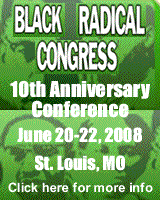 |
||||||||||||||||||||||
 |
||||||||||||||||||||||
 |
||||||||||||||||||||||
 |
||||||||||||||||||||||
 |
| The current issue is always free to everyone |
|
|
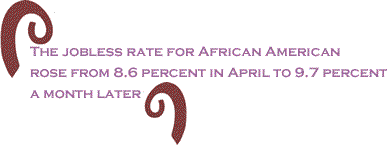 |
When I heard there was a sizable increase in black community joblessness between April and May I mentioned it to a few people and in return got that so-what-else-is-new? stare. “Every month, when unemployment rate data are released, the news for African Americans is bleak,” wrote educator Julianne Malveaux four years ago. Some things change, that doesn’t. The figures that tell the story are found in the eighth or ninth paragraph of a story on the government’s jobs report. But not much further is said about it and the matter disappears. “Out of Sight,” was the way New York Times columnist, Bob Herbert, put in last week. It helps - or hurts - to put faces and lives on the numbers, however. If nearly 10 percent of African American are out of work that means one out of every 10 black people has no reasonable means of earning a living and if they have dependents no way to adequately care for them. I am constantly reminded that the Bureau of Labor statistics are not particularly reliable, that the situation is usually worse than they evidence. This is particularly true when it comes to the number of people who have given up looking for work and dropped out of the active labor market. Still, the official statistics do tell a story, an ugly one - and one that’s getting worse as the country’s economy slip further into disrepair. The nation’s official jobless rate leaped from 5.0 percent in April to 5.5 percent in May, far outstripping the expectation that the increase would be to 5.1 percent. It was the largest percentage increase in 22 years. The jobless rate for African American rose from 8.6 percent in April to 9.7 percent a month later.
“When the dismal unemployment numbers were released on Friday (at the same time that oil prices were surging to record highs), I thought about the young people at the bottom of the employment ladder,” wrote columnist Herbert, “Below the bottom, actually.” “The young people I'm talking about wouldn't have noticed,” he wrote. “These are the teenagers and young adults - roughly 16 to 24 years old - who are not in school and basically have no hope of finding work. The bureaucrats compiling the official unemployment rate don't even bother counting these young people. They are no one's constituency. They might as well not exist.” “This is the flip side of the American dream,”
wrote Herbert on June 10. “The Herbert was writing about both the nearly 260,000 African American teenagers actively seeking employment in May 2008 and didn’t find any and what he estimates to be a total of 4 million black kids out of work and on the streets and fodder for the so-called criminal justice system and the prison-industrial complex it enriches. One reason the teenage unemployment rate
is so high is because the availability of summer jobs is lower
than it’s been in 50 years.
“ I was at a conference a couple weeks ago where there was a lot of talk about the reality of socio-economic class in the contemporary U.S. and the necessity of progressives and organized labor to speak up for the unorganized, the marginalized and the unemployed. A good place to start would be with a program to organize and aid those young people behind the monthly stats, who are mentioned briefly in the media and then rendered out of sight. BlackCommentator.com
Editorial
Board member Carl Bloice is a writer in |
Your comments are always welcome. e-Mail
re-print notice
If you send us an e-Mail message we may publish all or part of it, unless you tell us it is not for publication. You may also request that we withhold your name. Thank you very much for your readership. |
|
| June
12, 2008 Issue 281 |
|
| Executive Editor: Bill Fletcher, Jr. |
| Managing
Editor: |
| Publisher: Peter Gamble |
| Est. April 5, 2002 |
| Printer Friendly Version in resizeable plain text format or pdf format. |
 |
 |
 |
| |
| |





















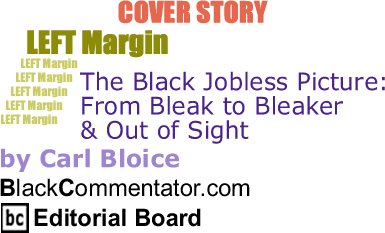

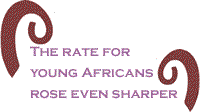 Robert
Brusca, head of Fact and Opinion Economics, told the Los
Angeles Times that while the rise in the jobless rate from
April to May was being blamed largely on an increase in teenage
unemployment, "the fact is that unemployment - for just
about every category - [was] up in May, just not as sharply
as for teenagers." The rate for young Africans rose even
sharper. While overall teenage unemployment increased to 18.7
percent, African American teen unemployment remains more than
six times the national rate, rising on a seasonally adjusted
basis from 24.5 percent to 32.3 percent.
Robert
Brusca, head of Fact and Opinion Economics, told the Los
Angeles Times that while the rise in the jobless rate from
April to May was being blamed largely on an increase in teenage
unemployment, "the fact is that unemployment - for just
about every category - [was] up in May, just not as sharply
as for teenagers." The rate for young Africans rose even
sharper. While overall teenage unemployment increased to 18.7
percent, African American teen unemployment remains more than
six times the national rate, rising on a seasonally adjusted
basis from 24.5 percent to 32.3 percent.

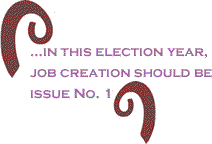 Those
on the political right won’t accept that it’s the system that’s
failing these working class kids, opting instead to place the
blame on the African American community itself, And those in
the community that echo such nonsense won’t acknowledge it either;
it would mean standing up to the forces and policies that have
produced the obscene social and economic inequality that has
grown over the past couple of decades.
Those
on the political right won’t accept that it’s the system that’s
failing these working class kids, opting instead to place the
blame on the African American community itself, And those in
the community that echo such nonsense won’t acknowledge it either;
it would mean standing up to the forces and policies that have
produced the obscene social and economic inequality that has
grown over the past couple of decades.






